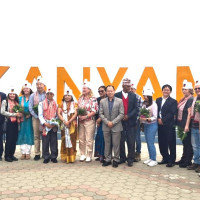- Monday, 14 April 2025
Prevent Indiscriminate Use Of Pesticides
Agriculture continues to be the foundation of Nepal's economy with more than 60 per cent of the workforce employed and a substantial Gross Domestic Product (GDP) contribution. However, despite its importance, it faces a serious problem i.e. the widespread and frequently uncontrolled use of chemical pesticides. The growing use of pesticides to boost crops and manage pests is causing concern in the sectors such as economics, environment, and public health. It is, therefore, essential that we promote more sustainable farming methods and adopt rational pesticides use.
The pesticides use has continuously increased over the last 20 years. Per hectare pesticide use may seem less as compared to its neighbours, indiscriminate use in particular areas, like the Tarai and peri-urban vegetable belts, are of great concern. Pesticide use is especially high in areas like Chitwan, Kavrepalanchowk and Dhading because of the intense vegetable farming. The frequently used pesticides include synthetic pyrethroids, carbamates, and organophosphates. Still farmers frequently use more pesticides than is advised because they lack the necessary training or guidance. Overuse reduces the effectiveness of pest control, this rather contribute for the development of resistant pests, which starts a vicious cycle of increased dependency on chemicals.
Weak regulation
One of the main factors causing overuse is the weak regulation and enforcement mechanism. The reality differs from the legal mechanism for the registration, importation, and distribution of pesticides. Owing to limited resources, the concerned department struggles to effectively monitor pesticide imports, sellers, and consumers. Still a number of extremely hazardous pesticides (HHPs) that are prohibited or regulated in other nations are available in Nepali market. Monitoring and testing for residues in agricultural products as well as in soil or water systems is further hampered by the absence of accredited labs and technical human resources.
Unregulated pesticide use is not only a problem in agriculture; it is also a potential public health emergency. Pesticide exposure has been associated with health concerns ranging from respiratory and skin irritation to more serious outcomes like cancer and neurological diseases. The brunt of the exposure is experienced by farmers and labourers, who frequently lack the necessary protective equipment and training. Consumers are also not exempt. Fruits and vegetables with dangerous level of pesticides are transported to marketplaces and ultimately end up on dinner tables with no oversight of pesticide residues.
The government started testing for pesticide residues at Kathmandu Valley entry points in 2019, however, the absence of coordination and infrastructure made this programme short-lived. The environmental effects of pesticides are equally concerning. Pesticides not only harm water systems, contaminate soil but also ultimately reduce biodiversity. Pollinators like bees which are beneficial insects faces collateral harm in the fight against pests. When runoff from agricultural fields enters rivers and lakes aquatic ecosystem also suffers.
Poor knowledge among farmers is another contributing factor to the indiscriminate use of pesticides. Many turn to local pesticide retailers or agro-vets for guidance, which is often motivated by sales rather than necessity. Integrated pest management (IPM) has not gained momentum despite being supported by both the government and non-governmental organisations. Many farmers are still unfamiliar with the core concepts of IPM, especially those who value short-term benefits over long-term sustainability.
In spite of these obstacles, change is achievable owing to many of the positive trends. A number of NGOs and institutions are promoting organic agricultural methods. Municipalities such as Lalitpur and Bhaktapur have taken action to promote pesticide-free vegetables in their local markets and obtain organic certification. Farmer cooperatives in some areas like have demonstrated that market incentives combined with community-driven change can result in less pesticide use without lowering income.
Awareness
Additionally, awareness of pesticide-free produce among consumers is steadily growing. There is a market trend for chemical-free farming since urban dwellers are ready to pay a premium for organic produce. This trend has the potential to be a principal force for change if backed by strong regulations and investments in supply chains and certification. The government can update its pesticide laws to suit contemporary reality by stricter import restrictions and stronger penalties for illicit sales. Therefore, it is recommended to provide more funding to regulatory agencies so they can monitor and enforce laws.
It is equally important to support regular training on IPM, safe handling techniques, and chemical pesticide substitutes to farmers. These initiatives should be scaled up with the use of public-private partnerships throughout the country. Both consumers and exporters would be protected by the establishment of state-of-the-art laboratories for evaluating pesticide residues at the regional level. Like chemical fertilizers, biopesticides and organic inputs should be subsidized by the government.
Large scale public awareness campaigns can assist consumers in making wise decisions. Local governments should initiate an endeavour for marketplaces organic produce and facilitate the direct link between farmers and consumers. The irrational use of pesticides is reaching a tipping point. It not only poses a threat to the agricultural output and ecology but also overall health if left unchecked. However, Nepal has the opportunity to transition to a more robust, safe, and sustainable agriculture system with a coordinated effort from the government, civil society, farmers, and consumers. The question is not whether change is required, but rather how urgently we are prepared to take action.
(Dr. Lohani is the executive director at the Health Concern. lohanis@gmail.com)






-original-thumb.jpg)








